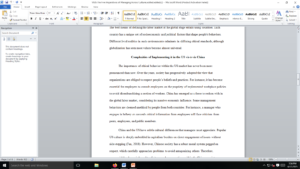Cross-cultural management
According to Branine (2011), there are five imperatives of managing effectively across cultures:
- Valuing diversity and equality as integral to organizational effectiveness
- Creating a competitive advantage through flexible working practice and family-friendly policies
- Understanding ethical and unethical behaviors in other countries
- Transforming the use of information and communications across borders
- Developing a sense of employee environmental awareness and well-being
Write a 700- to 1,050-word paper that discusses in detail one of the imperatives of managing effectively across cultures. Include the following in your paper:
- The complexities of implementation of these distinct moves in the United States and one international labor market, such as England, Germany, Kenya, China, Jamaica West Indies, or the United Arab Emirates
- Compare the levels of progress made in the targeted locales.
- Draw conclusions about possible next steps in promoting progress.
Format your paper according to APA guidelines.
Requirements: 700-1050
Answer preview
Despite globalization shaping most people’s experiences and perspectives on different issues, smaller environmental factors are responsible for cultural differences between people from the same country, let alone the entire world. Employers must create the best and most accommodative environment for people from different backgrounds to co-exist. Employees are human beings with feelings and to get the best out of them is to create accommodative settings. Fairness and equitable treatment are essential pillars of cross-cultural management of the labor force available to the company as it improves employee satisfaction. From the discussion above, it is clear that profitability is not the sole matrix for assessing the effectiveness of managerial
[922 Words]

Cross-cultural management

